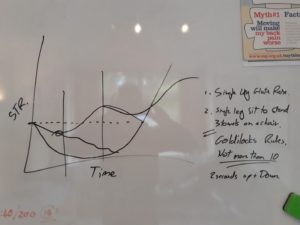Something that comes up when talking with people about physio and appointments is the number of treatments they might or might not need. I know that in the realms of the NHS, 3-4 and sometimes up to 6 appointments are often suggested and you continue to go until those appointments are done.

We aren’t profit driven. We work to make you better.
There are other physios and other professions that also work on this kind of basis, suggesting, or sometimes insisting that you pay up front for a course of a number of sessions over the next few weeks or months so that you can come back whenever they deem necessary in order for them to apply the treatment for you to be better. Effectively the control of your injury is taken from you and given to them.
I always wondered how they decide on how many times you should come back. Do they look at your wallet and work out how many sessions you can afford? Do they know your physiology so well that they can predict exactly what is going to happen? I’m not going to get into why *I* think they do it, but suffice to say, we work in a slightly different way.
During an initial assessment it is really hard to tell exactly how long something is going to take to heal, or for something to get better/ stronger. Oh yes, we have some idea as to how long a muscle takes to recover from a strain, how long a ligament will take to reduce in swelling or how long a tendon will take to overcome a tendinopathy. That is in an ideal word though, and we certainly live in a world that is far from ideal.

Polypharmacy….
Everyone has their own complicating factors be it polypharmacy (taking various medications which might interfere with the timeline), a lack of time to do what they need to do to get better, lack of enthusiasm, understanding etc. which all have an effect on how long things take to improve.
Not knowing how long an individual might take to improve then puts you in a bit of a spot when asked “how many times to I need to come back”?
People invariably get some homework to do. Actions or movements to practice, to build up and improve upon. Often they get done and the only reason to come back to see me is to check on improvement, to get an idea on how to progress the movements and ensure that there is nothing which is getting in the way of the ultimate goal of getting better.

Classic homework on the whiteboard
Obviously that is the simplest of outcomes – with more complicated cases we start at the basics of movement and as pain reduces and ability returns we progress through a number of iterations of movements until we finally return to “play” as it were.
Yes Professional footballers might get a physio session everyday – which is fine and lovely, but all they need to do is be able to play football. They don’t need to worry about getting to work and home again, taking the kids to school, after school clubs, going shopping, etc etc. Not everyone can take that much time out from “life”. We try to work around the complicated bits to make sure the client has the best chance of getting better.

The best thing about coming back is you get to see Hobbes more.
Each appointment ends with a suggestion that we get in touch with each other in a couple of weeks to see how they have improved – if they have and I don’t need to see them again, brilliant – get on with life and fun stuff. If we need to review, then equally, that is fine – and we set up an appointment if they so desire.




